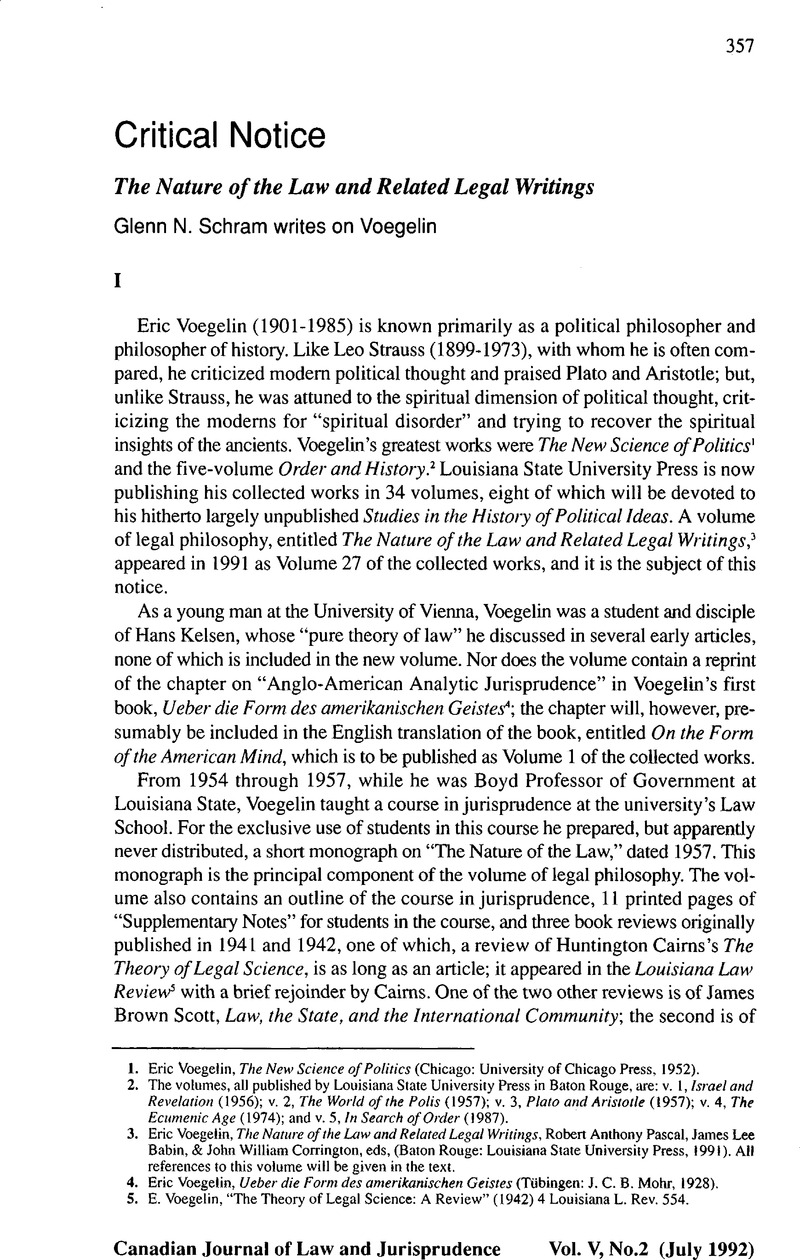No CrossRef data available.
Article contents
The Nature of the Law and Related Legal Writings
Published online by Cambridge University Press: 09 June 2015
Abstract

- Type
- Critical Notice
- Information
- Copyright
- Copyright © Canadian Journal of Law and Jurisprudence 1992
References
1. Voegelin, Eric, The New Science of Politics (Chicago: University of Chicago Press, 1952).Google Scholar
2. The volumes, all published by Louisiana State University Press in Baton Rouge, are: v. I, Israel and Revelation (1956); v. 2, The World of the Polis (1957); v. 3, Plato and Aristotle (1957); v. 4, The Ecumenic Age (1974); and v. 5, In Search of Order (1987).
3. Voegelin, Eric, The Nature of the Law and Related Legal Writings, Anthony Pascal, Robert, James Babin, Lee & William Corrington, John, eds, (Baton Rouge: Louisiana State University Press, 1991). All references to this volume will be given in the text.Google Scholar
4. Voegelin, Eric, Ueber die Form des amerikanischen Geistes (Tubingen: J.C.B. Mohr, 1928).Google Scholar
5. Voegelin, E., “The Theory of Legal Science: A Review” (1942) 4 Louisiana L.Rev. 554.Google Scholar
6. Of the four books reviewed, Voegelin deals most severely with the Cairns volume (Chapel Hill, N.C: University of North Carolina Press, 1941), which he calls “a terrifying symptom of the disorder in which we live” (112).
7. For a good selection of readings following this tripartite division of answers to the question “What is law?” see Golding, M.P., ed., The Nature of Law: Readings in Legal Philosophy (New York: Random House, 1966). It should be noted that some writers, including apparently Voegelin himself, conceive of a fourth school of jurisprudence, historical jurisprudence (87). But this school receives relatively little attention in the English-speaking world.Google Scholar
8. Hall, Jerome, “From Legal Theory to Integrative Jurisprudence” (1964) 33 U. Cincinnati L. Rev. 153 at 194.Google Scholar
9. Ehrlich, Eugen, “Fundamental Principles of the Sociology of Law,” in Morris, Clarence, ed., The Great Legal Philosophers: Selected Readings in Jurisprudence (Philadelphia: University of Pennsylvania Press, 1971) 437 at 440.Google Scholar
10. Cf. the following statement: “the lawmaking process partakes of the nature of the law inasmuch as it serves the purpose of securing the substance of order in society” (26).
11. Toward the end of his life Voegelin renounced the use of the word transcendent to describe divine reality, but this point need not concern us. See Ehrlich, Eugen Voegelin, Eric, What Is History? and Other Late Unpublished Writings, Hollweck, Thomas A. & Caringella, Paul, eds, (vol. 28 of Collected Works of Eric Voegelin) (Baton Rouge: Louisiana State University Press, 1990) at 218.Google Scholar
12. Voegelin apparently got the term ius divinum et naturale from Jean Bodin, a Christian mystic and one of the few modern political thinkers whom he admired (31).
13. On the preceding page Voegelin describes the ontological Ought as “the reality of order” (54). Cf.: “The [ontological] Ought…is not itself a ‘postulate’ or a ‘norm’ but the experienced tension between the order of being and the conduct of man” (44).
14. Though Voegelin did not consider himself a conservative, he thought that revolutions often do more harm than good, and in a different context he writes, “The undisturbed order of the society enters as a good in its own right into the normativity of the legal rules” (61).
15. Voegelin, Eric, Autobiographical Reflections, ed. by Sandoz, Ellis (Baton Rouge: Louisiana State University Press, 1989) at 21.Google Scholar
16. Kelsen, Hans, “The Pure Theory of Law” in Golding, , supra, note 7 at 126.Google Scholar
17. Voegelin, supra, note 15 at 21.
18. Summa Theologica I-II Qu. 91 Art. 2. The translation is by J.G. Dawson.
19. Ibid. at Art. 1–2.
20. Voegelin, Eric, Anamnesis: Zur Theorie der Geschichte unci Politik (Munich: R. Piper & Co., 1966) at 121–24.Google Scholar
21. Strauss, Leo, Natural Right and History (Chicago: University of Chicago Press, 1953) at 156–63.Google Scholar
22. Nicomachean Ethics at 1134bl8–1135al4.
23. Voegelin, Eric, Anamnesis, trans. Gerhart Niemeyer (Notre Dame, Ind.: University of Notre Dame Press, 1978) at 61–62.Google Scholar
24. Ibid, at 62.
25. Cf. Timasheff, N.S., “The Sociological Place of Law,” in Hall, Jerome, ed., Readings in Jurisprudence (Indianapolis: Bobbs-Merrill, 1938) at 1037.Google Scholar
26. Voegelin, Eric, “La société industrielle à la recherche de la raison” in Aron, Raymond et al., eds, Colloques de Rheinfelden (Paris: Calmann-Lévy, 1960) 44 at 53;Google Scholar Voegelin, Eric, “Celebratory Statement” (1982) 26 Modern Age 377.Google Scholar
27. Maritain, Jacques, Christianity and Democracy & The Rights of Man and Natural Law, trans. Anson, Doris C. (San Francisco: Ignatius Press, 1986) at 144–48.Google Scholar




